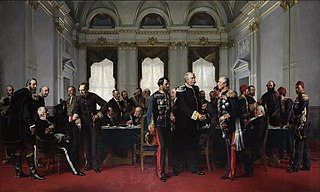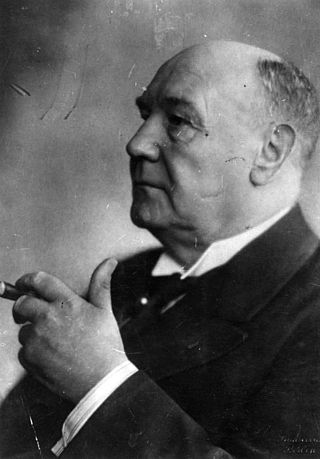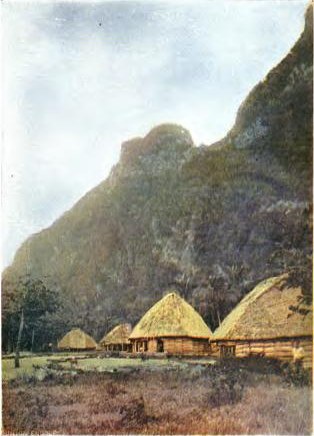
The German Empire, also referred to as Imperial Germany, the Second Reich, or simply Germany, was the period of the German Reich from the unification of Germany in 1871 until the November Revolution in 1918, when the German Reich changed its form of government from a monarchy to a republic.

The Samoan Islands were first settled some 3,500 years ago as part of the Austronesian expansion. Both Samoa's early history and its more recent history are strongly connected to the histories of Tonga and Fiji, nearby islands with which Samoa has long had genealogical links as well as shared cultural traditions.

Georg Leo Graf von Caprivi de Caprara de Montecuccoli was a German general and statesman who served as the chancellor of the German Empire from March 1890 to October 1894. Caprivi promoted industrial and commercial development, and concluded numerous bilateral treaties for reduction of tariff barriers. However, this movement toward free trade angered the conservative agrarian interests, especially the Junkers. He promised educational reforms to the Catholic Center party which would increase their influence, but failed to deliver. As part of Kaiser Wilhelm's "new course" in foreign policy, Caprivi abandoned Bismarck's military, economic, and ideological cooperation with the Russian Empire, which historians consider a major mistake. Even worse, Caprivi misjudged multiple opportunities to open good relations with the United Kingdom of Great Britain and Ireland. Frustrated, Britain turned to the Empire of Japan and the French Third Republic for agreements. Caprivi's downfall came with trade agreements that favored German industry and urban workers over more powerful agricultural interests. Historians praise his refusal to renew the harsh restrictions on socialists, and his success in the reorganization of the German military.

The Treaty of Berlin was signed on 13 July 1878. In the aftermath of the Russian victory against the Ottoman Empire in the Russo-Turkish War of 1877–1878, the major powers restructured the map of the Balkan region. They reversed some of the extreme gains claimed by Russia in the preliminary Treaty of San Stefano, but the Ottomans lost their major holdings in Europe. It was one of three major peace agreements in the period after the 1815 Congress of Vienna. It was the final act of the Congress of Berlin and included Great Britain and Ireland, Austria-Hungary, France, Germany, Italy, Russia and the Ottoman Empire. Chancellor of Germany Otto von Bismarck was the chairman and dominant personality.

The Berlin Conference of 1884–1885, also known as the Congo Conference or West Africa Conference, met on 15 November 1884, and after an adjournment concluded on 26 February 1885, with the signature of a General Act, regulating the European colonisation and trade in Africa during the New Imperialism period. The conference was organized by Otto von Bismarck, the first chancellor of Germany at the request of King Leopold II. The General Act of Berlin can be seen as the formalisation of the Scramble for Africa that was already in full swing. Some historians however warn against an overemphasis of its role in the colonial partitioning of Africa, and draw attention to bilateral agreements concluded before and after the conference. The conference contributed to ushering in a period of heightened colonial activity by European powers, once made the point that the Berlin Conference of 1884–85 was responsible for "the old carve-up of Africa". Other writers have also laid the blame in "the partition of Africa" on the doors of the Berlin Conference. But Wm. Roger Louis holds a contrary view, although he conceded that "the Berlin Act did have a relevance to the course of the partition" of Africa. Of the fourteen countries being represented, seven of them – Austria-Hungary, Russia, Denmark, the Netherlands, Sweden–Norway, the Ottoman Empire and the United States – came home without any formal possessions in Africa.

German Samoa was a German protectorate from 1900 to 1920, consisting of the islands of Upolu, Savai'i, Apolima and Manono, now wholly within the Independent State of Samoa, formerly Western Samoa. Samoa was the last German colonial acquisition in the Pacific basin, received following the Tripartite Convention signed at Washington on 2 December 1899 with ratifications exchanged on 16 February 1900. It was the only German colony in the Pacific, aside from the Jiaozhou Bay Leased Territory in China, that was administered separately from German New Guinea.

The Hague Conventions of 1899 and 1907 are a series of international treaties and declarations negotiated at two international peace conferences at The Hague in the Netherlands. Along with the Geneva Conventions, the Hague Conventions were among the first formal statements of the laws of war and war crimes in the body of secular international law. A third conference was planned for 1914 and later rescheduled for 1915, but it did not take place because of the start of World War I.
A condominium in international law is a political territory in or over which multiple sovereign powers formally agree to share equal dominium and exercise their rights jointly, without dividing it into "national" zones.

The Congress of Berlin was a diplomatic conference to reorganise the states in the Balkan Peninsula after the Russo-Turkish War of 1877–78, which had been won by Russia against the Ottoman Empire. Represented at the meeting were Europe's then six great powers: Russia, Great Britain, France, Austria-Hungary, Italy, and Germany; the Ottomans; and four Balkan states: Greece, Serbia, Romania and Montenegro. The congress concluded with the signing of the Treaty of Berlin, replacing the preliminary Treaty of San Stefano that had been signed three months earlier.

Henry Clay Ide was a U.S. judge, colonial commissioner, ambassador, and Governor-General of the Philippines.

The German colonial empire constituted the overseas colonies, dependencies, and territories of the German Empire. Unified in the early 1870s, the chancellor of this time period was Otto von Bismarck. Short-lived attempts at colonization by individual German states had occurred in preceding centuries, but Bismarck resisted pressure to construct a colonial empire until the Scramble for Africa in 1884. Claiming much of the remaining uncolonized areas of Africa, Germany built the third-largest colonial empire at the time, after the British and French. The German colonial empire encompassed parts of several African countries, including parts of present-day Burundi, Rwanda, Tanzania, Namibia, Cameroon, Gabon, Congo, Central African Republic, Chad, Nigeria, Togo, Ghana, as well as northeastern New Guinea, Samoa and numerous Micronesian islands. Including mainland Germany, the empire had a total land area of 3,503,352 square kilometers (1,352,652 sq mi) and population of 80,125,993 people.

Wilhelm Heinrich Solf was a German scholar, diplomat, jurist and statesman.

The Tripartite Convention of 1899 concluded the Second Samoan Civil War, resulting in the formal partition of the Samoan archipelago into a German colony and a United States territory.
The turbulent decades of the late 19th century saw several conflicts between rival Samoan factions in the Samoan Islands of the South Pacific. The political struggle lasted roughly between 1886 and 1894, primarily between Samoans contesting whether Malietoa Laupepa, Mata'afa Iosefo, or a member of the Tupua Tamasese dynasty would be King of Samoa. While largely a political struggle, there were also armed skirmishes between the factions. The military of the German Empire intervened on several occasions. A naval standoff between the United States, Germany, and the United Kingdom ensued.

The Second Samoan Civil War was a conflict that reached a head in 1898 when Germany, the United Kingdom, and the United States were locked in dispute over who should have control over the Samoan island chain, located in the South Pacific Ocean.

The islands of Samoa were originally inhabited by humans as early as 850 BC. After being invaded by European explorers in the 18th century, by the 20th and 21st century, the islands were incorporated into Samoa and American Samoa.

German West Africa (Deutsch-Westafrika) was an informal designation for the areas in West Africa that were part of the German Colonial Empire between 1884 and 1919. The term was normally used for the territories of Cameroon and Togo. German West Africa was not an administrative unit. However, in trade and in the vernacular the term was sometimes in use.

This article covers worldwide diplomacy and, more generally, the international relations of the great powers from 1814 to 1919. This era covers the period from the end of the Napoleonic Wars and the Congress of Vienna (1814–1815), to the end of the First World War and the Paris Peace Conference (1919–1920).

The Chief Justice of Samoa is the chief justice of the Supreme Court of Samoa. The qualifications and powers of the office are governed by Part VI of the Constitution of Samoa and the Judicature Ordinance 1961. The position is currently held by Satiu Simativa Perese.
The history of German foreign policy covers diplomatic developments and international history since 1871.















